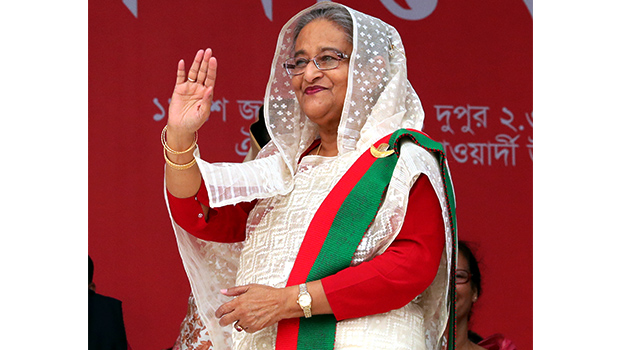Covid-19 a blessing in disguise
Govt’s virus efforts lead to huge public awareness on hygiene practice


Irrespective of its sheer negative impact, the global pandemic of coronavirus has a brighter side – it has massively heightened public awareness on hygiene practice.
With a view to fighting the deadly coronavirus, the century’s worst health hazard, people have to adopt some particular habits and health guidelines.
Prime Minister Sheikh Hasina’s government has taken several effective initiatives to face the pandemic.
The Premier also said, “The people of Bangladesh can fight and win the situation.”
She also instructed all to follow the health guidelines and maintain hygiene practices.
Experts suggested everyone to wear face masks, wash hands with soap for at least 20 seconds, avoid public gathering, maintain social distance and so on.
Such compelling situation of raising awareness amid a health safety crisis of facing a highly infectious disease like the Covid-19 has led to an exceptional advantage, in particular in Bangladesh, where there are comparatively lower levels of knowledge on the benefits of hygiene practice.
Current evidence indicates that the coronavirus is transmitted through respiratory droplets or contact. People in general, are exposed to such risky contamination when in public places and the practice of covering nose and mouth while coughing and sneezing is very low.
Contact transmission occurs when contaminated hands touch the mucosa of the mouth, nose, or eyes. The virus can also be transferred from one surface to another by contaminated hands, which facilitates indirect contact transmission.
Hygiene practice, in general, has always remained a major issue in Bangladesh to prevent infectious diseases like pneumonia, typhoid fever, tuberculosis, rubella, meningitis, hepatitis, haemophilus influenza disease and common flu.
International partners like the World Health Organisation (WHO), Unicef, Unfpa and many other organisations in Bangladesh continue to fund special awareness campaigns to improve hygiene practice and also the quality of life.
Despite the efforts, hygiene practice, in particular with washing hands remain ignored largely in public places.
A 2013 UNICEF survey found knowledge of key hygiene messages is high in Bangladesh, however, the practice of effective handwashing, the most effective hygiene behaviour, is very low. Just about 59 per cent of people practice handwashing with water and soap at critical times.
In 2007 a project titled - Hygiene Education and Water Supply-Bangladesh (SHEWA-B) targeted some 30 million underserved people. It was the largest intensive handwashing, hygiene, sanitation and water quality improvement programs ever attempted in Bangladesh.
Consequently, the efforts were not very impressive and till recently hygiene practices behaviour remains low especially among the rural and semi-urban population.
Although still low there is a general observation that people living in urban and semi-urban settings are showing the behaviour of following the good practices of hygiene amid fears of contaminating coronavirus.
"I have never before washed my hands and sanitized things that I touch in public. Coronavirus has changed my behaviour on hygiene practices," said Ali Jafar, a banker living in Banani.
A resident in Hatkhola echoed similar voice saying, "To survive in the corona era one has to know how to stay safe and keep others around him/her safe. So, it is extremely important to practice hygiene."
The heightened awareness is well reflected in a sudden increase in the sale of hand sanitizers, household and office floor disinfectants, sterilizing sprays, soaps, liquid handwashing packets, face masks, hand gloves and other health safety protective gears.
Most retail shops now offer such products that protect a person from such infection in public places.
"There is a huge demand for hand sanitizers," said an area manager of a manufacturer of a hand sanitizer.
"We have supplied more than 5 lakh pieces of hand sanitizers in several retailers across the capital and other cities like Khulna, Rajshahi, Rangpur, Bogura and Sylhet," said another official who imports such health safety items.
In shopping malls, most retailers offer hand washing to assure customers about health safety measures.
"I think people are now more aware of protecting themselves from the transmission of coronavirus. But in the long run, I believe we would continue this behaviour in public places," said Monica Binte-Rashid, a university student in the capital.
The heightened awareness and subsequent hygiene practice are also noticed among the lower-class people of the society who in general used to be ignorant about hygiene practice.
Auto-rickshaw driver KartikMondol thinks it is important to practice handwashing every time passengers ride his vehicle.
"I heard about coronavirus. I don't want to take any risk of infecting myself and my family. Who knows who is carrying the virus but if i can protect myself it is my benefit," Mondol said.
Maya Akter, a housemaid in Gulshan also agrees that protecting oneself is important if one has to survive.
She says, "I heard that corona is highly infectious. As I work in multiple homes for household works i strictly follow hygiene, including using a face mask."
The trend in awareness about hygiene is gradually increasing even in rural areas where the practice of health safety is largely ignored due to low knowledge as well as the associated expenses involved.
"My uncle, who works in a retailer in a crowded market in Narayanganj, uses hand gloves and also offers sanitizing hands of customers. He had never before undertaken such initiative to protect himself and the customers,” said Mazed Hossain a student in the capital.
Tea stall owner Ranjit Dev in city’s Gabtoli also has similar views.
“I had never known about hand sanitizers. But since the corona crisis hand sanitizer is now a part of my life. I know it can save my life from being infected,” said Dev.
Meanwhile the WHO strictly recommends regularly and thoroughly cleaning hands, maintaining at least one metre (3 feet) distance between each other in public to avoid contamination from coughs, sneezes, or when someone speaks.
WHO also recommends avoiding going to crowded places and also touching eyes, nose and mouth.


